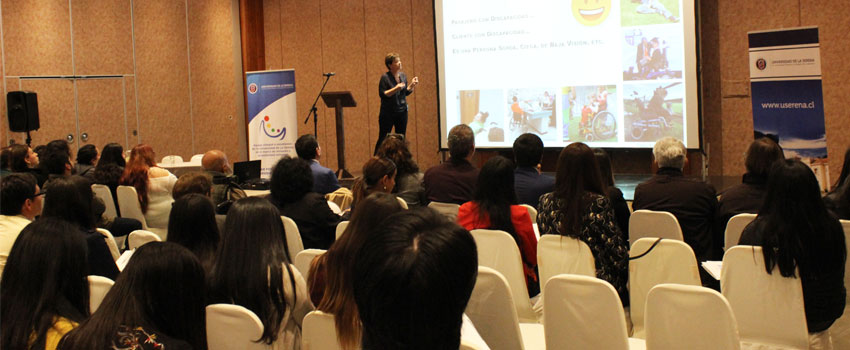
The event organized by the University of La Serena, was attended by university authorities and national and local exponents related to the topic.
With a large number of participants, the first Seminar on Accessibility to Infrastructure and Communications, La Serena más Inclusiva, organized by the University of La Serena, was held within the framework of the MINEDUC ULS1799 Project, where different exponents of national and local level related to the topic of universal accessibility.
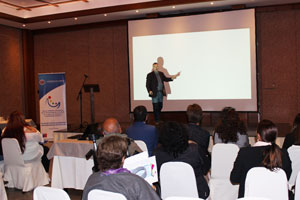 One of the participating institutions was the Accessible City Corporation, whose representative instructed on current infrastructure accessibility regulations. The Director of the ULS Information Technology and Computing Center, Andrés Moya, also spoke, referring to how technological procedures have been modified to create, at the University, more accessible platforms for people with disabilities. Meanwhile, Carolina Aguilera, from SENADIS Central Level, taught the new formats and technologies for inclusion.
One of the participating institutions was the Accessible City Corporation, whose representative instructed on current infrastructure accessibility regulations. The Director of the ULS Information Technology and Computing Center, Andrés Moya, also spoke, referring to how technological procedures have been modified to create, at the University, more accessible platforms for people with disabilities. Meanwhile, Carolina Aguilera, from SENADIS Central Level, taught the new formats and technologies for inclusion.
Likewise, the team from the Central Library of the University of La Serena was presented, led by Francisca Álvarez, a documentary librarian, who announced the work that the Library has done with audiobooks designed for students with visual disabilities.
The accessibility works carried out at the ULS were also announced, carried out by the Services Directorate, represented by its Director Marcos Sepúlveda, within the regulatory framework specified by the Law.
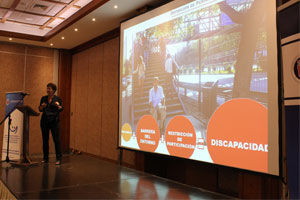 Also present at the presentations were Aguas del Valle, represented by the Head of Communications, Elizabeth Salinas, who from the private sphere told the experience of the transformation in terms of the corporate policy of diversity, inclusion and accessibility, with its Program “ Opening Spaces”; and the national person in charge of Public Use in Protected Wild Areas of CONAF Central Level, Ángel Lazo, who reported on the National Strategy for Universal Accessibility to Nature and its environment.
Also present at the presentations were Aguas del Valle, represented by the Head of Communications, Elizabeth Salinas, who from the private sphere told the experience of the transformation in terms of the corporate policy of diversity, inclusion and accessibility, with its Program “ Opening Spaces”; and the national person in charge of Public Use in Protected Wild Areas of CONAF Central Level, Ángel Lazo, who reported on the National Strategy for Universal Accessibility to Nature and its environment.
Regarding the importance of this event, the Director(s) of SENADIS emphasized the commitment that the ULS has with respect to the issue of inclusion and universal accessibility, highlighting the fact that the institution, before the promulgation of the Law, already was making changes to achieve inclusion.
About 150 people attended this activity, both from the public and private spheres. Among the authorities present were the Director(s) of regional SENADIS, Sergio Veliz, the Vice-Rector for Research and Postgraduate Studies, Dr. Eduardo Notte, representatives of the University of Atacama, Universidad Católica del Norte and Universidad de O'Higgins, of the municipalities from Ovalle, Coquimbo and La Serena, organizations, Teletón Foundation, academics and students of the University of La Serena and the community in general.
These types of events will be a constant within the commitment that the only state university in the region has with the community, giving a clear signal that the University is for everyone and for everyone.
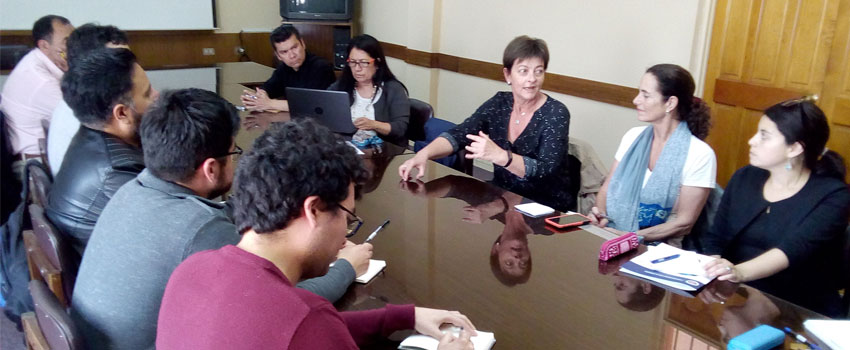


 One of the participating institutions was the Accessible City Corporation, whose representative instructed on current infrastructure accessibility regulations. The Director of the ULS Information Technology and Computing Center, Andrés Moya, also spoke, referring to how technological procedures have been modified to create, at the University, more accessible platforms for people with disabilities. Meanwhile, Carolina Aguilera, from SENADIS Central Level, taught the new formats and technologies for inclusion.
One of the participating institutions was the Accessible City Corporation, whose representative instructed on current infrastructure accessibility regulations. The Director of the ULS Information Technology and Computing Center, Andrés Moya, also spoke, referring to how technological procedures have been modified to create, at the University, more accessible platforms for people with disabilities. Meanwhile, Carolina Aguilera, from SENADIS Central Level, taught the new formats and technologies for inclusion. Also present at the presentations were Aguas del Valle, represented by the Head of Communications, Elizabeth Salinas, who from the private sphere told the experience of the transformation in terms of the corporate policy of diversity, inclusion and accessibility, with its Program “ Opening Spaces”; and the national person in charge of Public Use in Protected Wild Areas of CONAF Central Level, Ángel Lazo, who reported on the National Strategy for Universal Accessibility to Nature and its environment.
Also present at the presentations were Aguas del Valle, represented by the Head of Communications, Elizabeth Salinas, who from the private sphere told the experience of the transformation in terms of the corporate policy of diversity, inclusion and accessibility, with its Program “ Opening Spaces”; and the national person in charge of Public Use in Protected Wild Areas of CONAF Central Level, Ángel Lazo, who reported on the National Strategy for Universal Accessibility to Nature and its environment.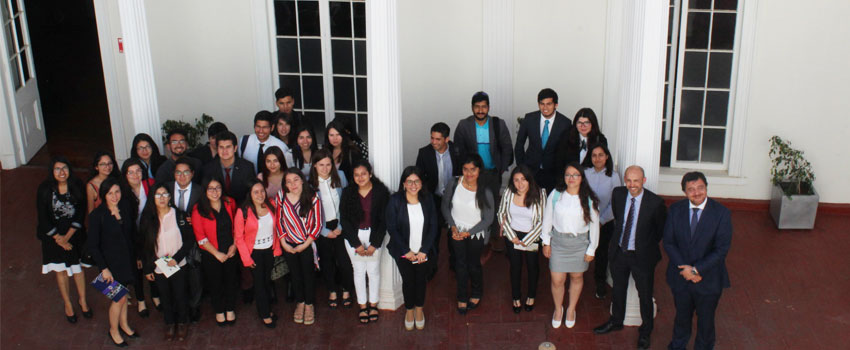
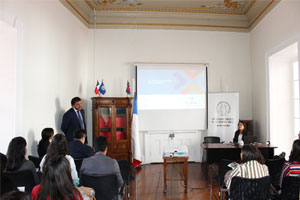 In addition, María Fernanda Ramírez G., head of the Legal Unit, and Cristhian Moller, head of the Internal Control Unit, participated, who also spoke about the main functions of the Legal, and Accounting and Audit areas, respectively.
In addition, María Fernanda Ramírez G., head of the Legal Unit, and Cristhian Moller, head of the Internal Control Unit, participated, who also spoke about the main functions of the Legal, and Accounting and Audit areas, respectively.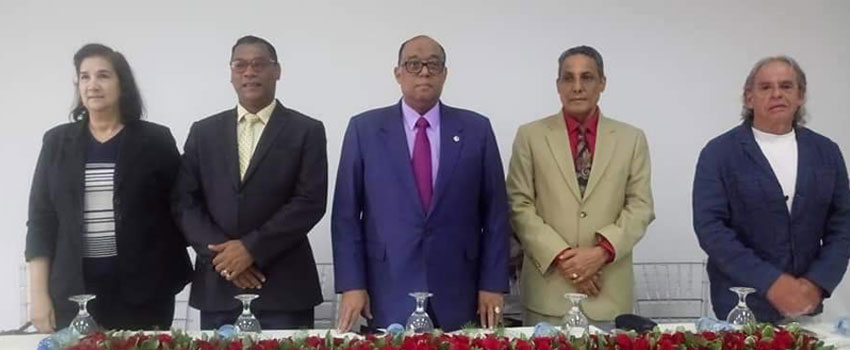
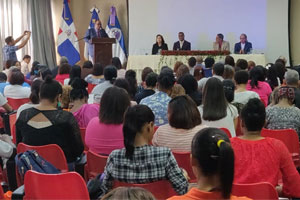 In the academic space, the teaching of the national language in the Dominican Republic was debated, with the purpose of identifying problems, presenting proposals for solutions and outlining expectations.
In the academic space, the teaching of the national language in the Dominican Republic was debated, with the purpose of identifying problems, presenting proposals for solutions and outlining expectations.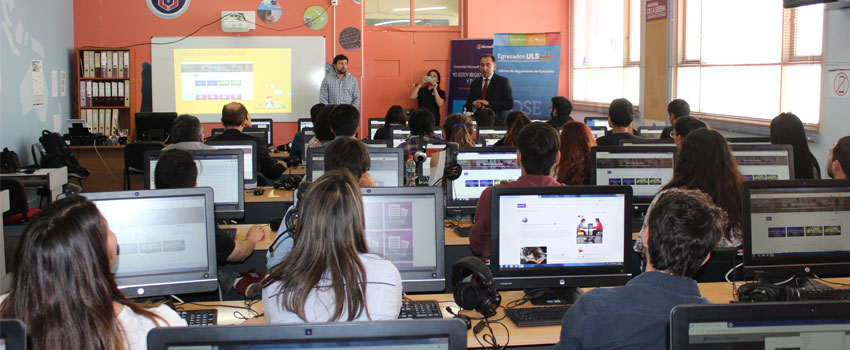
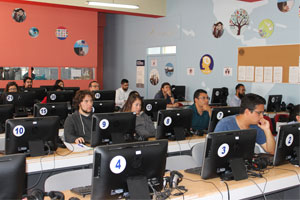 This training, which was jointly organized by the Graduate Monitoring Office and Microsoft, was part of the cooperative work carried out by the Directorate of Institutional Studies and Planning and the multinational technology company, which since 2017 has cooperated with different projects. intended for the implementation of new technologies and learning processes to the educational community of the University of La Serena.
This training, which was jointly organized by the Graduate Monitoring Office and Microsoft, was part of the cooperative work carried out by the Directorate of Institutional Studies and Planning and the multinational technology company, which since 2017 has cooperated with different projects. intended for the implementation of new technologies and learning processes to the educational community of the University of La Serena.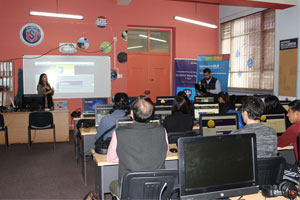 The teachers received this training in an intensive day in blocks, where they were able to learn about technology that can be incorporated to stimulate new ideas in the class process.
The teachers received this training in an intensive day in blocks, where they were able to learn about technology that can be incorporated to stimulate new ideas in the class process.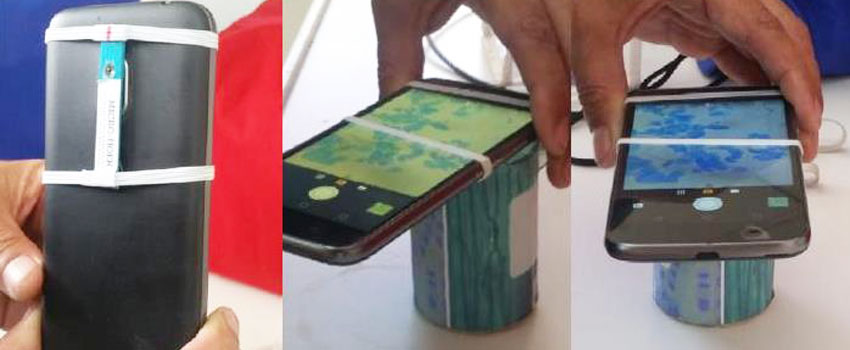
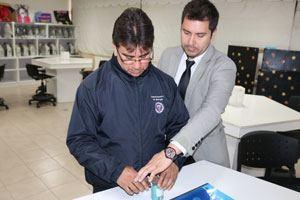 Given this background and as a way to contribute to the teaching and learning of microscopic biology in public educational establishments, both urban and rural, in the Coquimbo Region, and taking into account the new curricular bases and study programs of the MINEDUC , the specialized technician Edgardo Mundaca, and the professor of Biology and Natural Sciences, Mariano Rodríguez, with the sponsorship of the Research and Development Directorate (dependent on the Vice-Rector's Office for Research and Postgraduate Studies) and the Department of Biology of the University of La Serena , designed and created a smartphone adapter, made from electronic and household waste, that allows microscopic images to be captured.
Given this background and as a way to contribute to the teaching and learning of microscopic biology in public educational establishments, both urban and rural, in the Coquimbo Region, and taking into account the new curricular bases and study programs of the MINEDUC , the specialized technician Edgardo Mundaca, and the professor of Biology and Natural Sciences, Mariano Rodríguez, with the sponsorship of the Research and Development Directorate (dependent on the Vice-Rector's Office for Research and Postgraduate Studies) and the Department of Biology of the University of La Serena , designed and created a smartphone adapter, made from electronic and household waste, that allows microscopic images to be captured.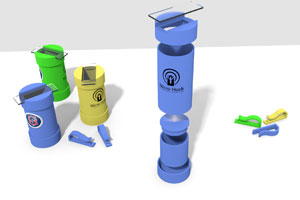 “88% of schools in Latin America do not have laboratory implementation. "This means that there is low scientific literacy," said Mariano Rodríguez, a graduate from the state campus, who added that the low-cost prototype could be used as a technological tool for teaching microscopic biology in the second basic cycle (5th grade). , 6th, 7th and 8th grade).
“88% of schools in Latin America do not have laboratory implementation. "This means that there is low scientific literacy," said Mariano Rodríguez, a graduate from the state campus, who added that the low-cost prototype could be used as a technological tool for teaching microscopic biology in the second basic cycle (5th grade). , 6th, 7th and 8th grade).